National Mission on Drugs: annual report
Sets out the progress made between 1 April 2023 and 31 March 2024 by national government, local government and third sector partners towards reducing drug deaths and improving the lives of those impacted by drugs in Scotland.
2. Cross Cutting Priorities
2.1 Overview
There are six priorities which cut across all our work. This chapter outlines the progress made in 2023-24 for each priority, and the next steps in delivery.
2.2 Progress in 2023-24
2.2.1 Lived and living experience (LLE)
The Scottish Government is committed to putting people affected by substance use at the heart of the National Mission. We aim to ensure that people affected by substance use, including families, are meaningfully involved in policy and decision making at both national and local levels. Meaningful involvement means that people can influence the outcome of decisions, as well as having their voices heard.
To support this, we continued to fund Alcohol and Drug Partnerships (ADPs) with £0.5 million in 2023-24, to improve the way people affected by substance use can take part in decision-making in their local area. We want to improve the quality of this participation, focusing on meaningful opportunities to influence outcomes and to improve services. ADPs are continuing the work of 2022-23 through:
- Developing LLE/family panels or reference groups that are part of an ADP subgroup,
- Increasing LLE/family representation at ADP Board level,
- Using questionnaires and surveys to help plan service provision,
- Consultation with independent LLE groups; e.g. in recovery communities or those supported by third sector organisations,
- Externally commissioned needs analyses conducted with LLE/family members, or peer research, whose findings feed into planning/decision making,
- Development of forums or strengthening established forums to utilise participatory budgeting,
- Supporting employment of people with LLE in the sector,
- Soliciting review from LLE/family groups on an ADP’s current participation methods,
- Dedicated peer and involvement workers to strengthen participation work,
- Staff training on a human rights-based approach/LLE and family participation.
The publication of the ADP 2023-24 Annual Survey Report in the autumn of 2024 will provide further insight into progress on LLE and family member participation at an ADP level. This will also be included in the National Mission on Drugs Annual Monitoring Report, published later this year.
The Scottish Government continues to fund third sector organisations to grow and sustain networks of people with lived and living experience of substance use. We know that independent, active networks that feed into their local areas, help to deliver services which better meet the needs of users. To support this ambition, the Scottish Drugs Forum (SDF) received over £300,000 in 2023-24 to ensure the voice of LLE is developed and enhanced in Scotland to inform and influence service development and delivery.
SDF currently supports 13 LLE groups in Scotland. As well as sharing experiences and offering feedback to local services, group members also participate in local and national research, surveys and feedback requests. To ensure that each group’s views and experiences are incorporated into improved services, regular meetings are held by service providers to report on progress and implement change. These management groups are now held in eight areas in Scotland.
Additionally, the project runs a national level group which includes representatives of the local area groups. It meets regularly and has been active in a range of peer events and conferences, where the group is building their capacity through sharing their experiences and learning from peers and through training.
In 2023-2024, the Scottish Recovery Consortium (SRC) supported the development and visibility of recovery communities in Scotland, working across 19 ADP areas and supporting over 64 organisations. SRC worked to ensure the voice of LLE is amplified and that recovery is visible both at a national and local level. Work to build the infrastructure and capacity required to connect and support people and organisations with LLE was developed in 2023-24 through the Lived Experience Recovery Organisation (LERO) and National Recovery Advocacy Network (NRAN).
SRC hosted the MAT Standards experiential team in partnership with Public Health Scotland (PHS). The data collected directly contributes to the national and local benchmarking activities and ensures those with LLE can share their experiences of local MAT Standards implementation. The work places lived experience at the heart of MAT Standards implementation and supports continuous improvement to ensure the integration of lived experience is embedded in local systems and structures.
2.2.2 Equalities and Human Rights
The National Collaborative
The Programme for Government 2023-24 included a commitment to: ‘Support the development of a Charter of Rights for people who use drugs, to increase accountability, monitoring and challenge in the context of the forthcoming Human Rights Bill.’
This is being taken forward by a National Collaborative, led by Human Rights Professor Alan Miller, and driven by a Change Team of people with lived experience of drug use and supported by a wider network of organisations, groups and individuals. The vision is to integrate human rights into drug and alcohol policy, leading to better outcomes for people affected by substance use.
As part of the Action Plan, set out in the roadmap, the National Collaborative has been co-designing a Charter of Rights and Implementation Framework following the FAIR model of a Human Rights Based Approach:
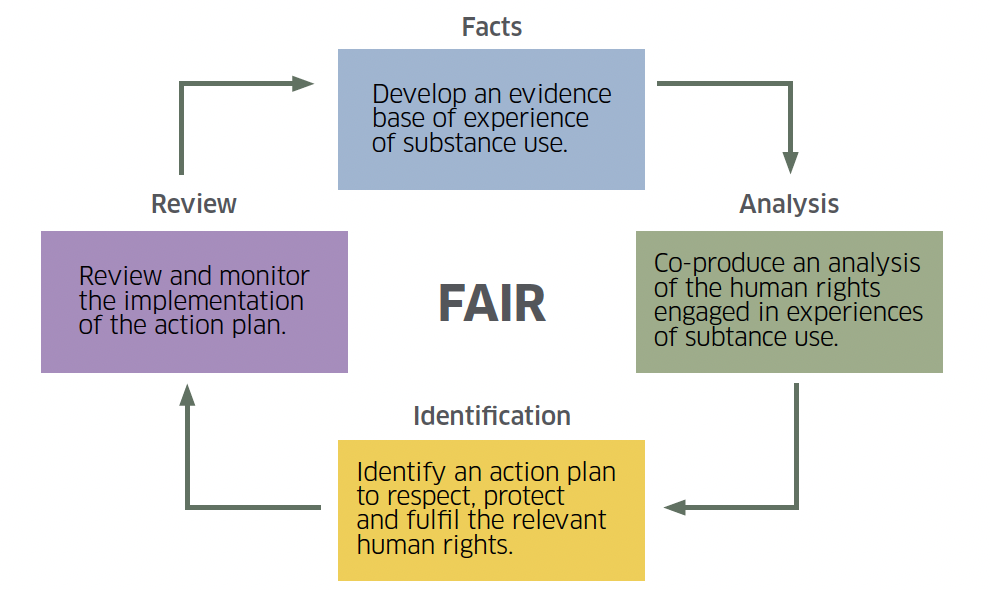
The Charter of Rights for people affected by substance use re-emphasises our shift from a criminal justice approach to a public health approach. The key rights are drawn from the forthcoming Scottish Human Rights Bill, the UK Human Rights Act and International Guidelines on Human Rights and Drug Policy. The draft Charter of Rights, published in December 2023, sets out how these rights can be effectively implemented to improve the lives of people affected by substance use.
After extensive planning with the Change Team, a Call for Evidence was launched to gather views from around Scotland about people’s experiences of substance use and human rights. Between May and August 2023, this brought together more than 650 people affected by substance use, their families and people working across a wide range of services.
An analysis report from the Call for Evidence was published in October 2023 summarising people’s experiences in relation to substance use and human rights. This information was used to inform the draft outline Charter of Rights. A video summary is also available, highlighting the main findings.
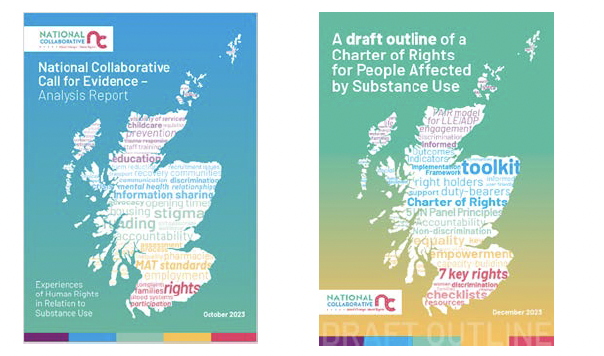
The draft Charter was informed by a public consultation and InterActions process (involving rights holders & duty bearers), both running from January to June 2024. A final version of the Charter will be published in December 2024. This video summarises the development of the draft outline Charter of Rights and includes reflections from Change Team members.
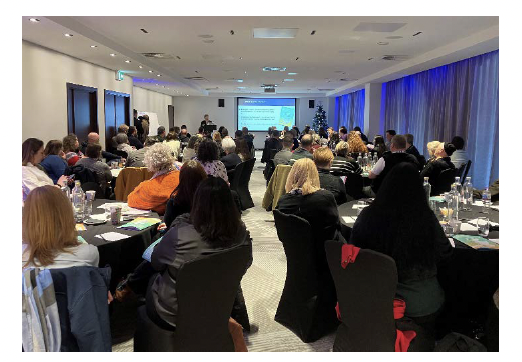
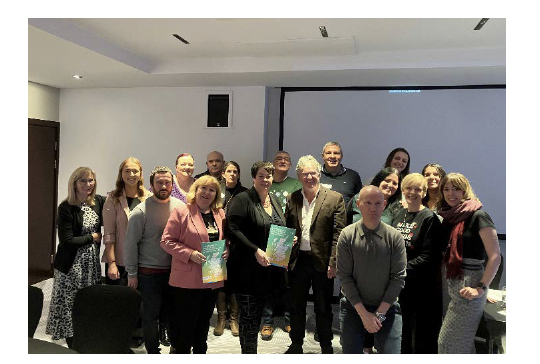
2.2.3 Tackling Stigma
Since publication in January 2023, work to deliver the actions outlined in the Stigma Action Plan, as set out in the cross-government response, has been ongoing. The plan outlined how Scottish Government will:
- Lead by example by interrogating internal policies and removing barriers for people affected by substance use
- Co-design, with people affected by substance use, interventions including a national programme to tackle social stigma, and a voluntary scheme for organisations to sign up to in order to remove structural stigma and associated barriers.
A co-design group began working on this in Spring 2024 and the co-design work will continue throughout the year. Alongside this, we have commissioned research with people with LLE, those working in the third sector and the public to inform the co-design workshops.
The next steps will be to continue the workshops and research, and produce a series of proposals on the details of a national programme and voluntary accreditation scheme.
2.2.4 Surveillance and Data Informed
We remain committed to improving our public health surveillance around substance use and this need has been further evidenced over the last year as new substances of concern have been identified in the drug supply in Scotland.
The Scottish Government are funding various research projects such as the surveillance study, operating from the accident and emergency department of the Queen Elizabeth University Hospital in Glasgow, which aims to establish a robust toxicology surveillance system in the emergency department. A Surveillance Study of Illicit Substance Toxicity (ASSIST) has been in operation since 2022, and explores the feasibility of reporting characteristics and the causes of patients attending hospital as an emergency due to illicit substance use.
The information this study provides has been vital for informing services, staff, drug organisations and those who use drugs about changes in the drug supply through the PHS quarterly RADAR reports. In addition, its findings have also informed public health alerts, such as those issued by PHS in relation to new substances of concern in the drug supply.
The Scottish Government is also funding a study by Glasgow Caledonian University which is evaluating the impact of public health interventions in Scotland’s Drug- Related Death epidemic. At the same time, funding has also been provided to PHS to construct a linked dataset, based on a cohort of people with problematic drug use. This data, that will enable surveillance and research to address a wide range of public health questions, such as the size and composition of the population with a drug use problem, mortality and morbidity among people with a drug use problem, and impact of specialist drug treatment and care.
Rapid Action Drug Alerts and Response (RADAR)
Throughout 2023-24, PHS continued to develop RADAR, Scotland’s drugs early warning system. The system collates and analyses a range of information relating to drug harms made available through organisations such as Police Scotland, NHS Health Boards, Scottish Prison Services, third sector and people with lived and living experience. This enables each local area to identify trends in drug harms, share key information across Scotland and ensure evidence-based approaches are in place to reduce drug harms.
To date, RADAR has identified several changes in the drug supply through its reports. The findings also informed public health alerts, such as those issued by PHS in relation to new substances of concern in the drug supply, including nitazenes, xylazine and bromazolam.
Prevalence
In March 2024, PHS, in collaboration with the University of Bristol and Glasgow Caledonian University, published their work to provide a renewed estimate of the number of people aged 15 to 64 years old with opioid dependence, along with estimates of the prevalence of this group among Scotland’s general population. PHS are developing their approach and plan to provide estimates for additional geographical areas and additional financial years. They also plan to explore the potential to incorporate other types of drug-related events into the statistical models, and to generate estimates for populations using other types of drugs. This work gives us a greater insight into the estimated scale of the challenges we face and allows us to better plan and resource services.
DAISy
The Drug and Alcohol Information System (DAISy) is a national database that holds demographic and treatment data about people who engage with specialist drug and alcohol treatment services in Scotland. The first DAISy treatment report was published in June 2023, providing an overview of initial assessments for specialist drug and alcohol treatment and representing an important milestone. The DAISy dataset aims to enable a better understanding of the impact of drug and alcohol treatment services at both a local and national level and supports analysis and reporting on treatment (including Official Statistics on waiting times) to inform national policy and practice.
PHS are conducting a review of the DAISy system to ensure it remains fit for purpose, and tracks relevant contemporary treatment modalities in the face of dynamic trends in drug use. PHS publish reports on drug and alcohol treatment services across Scotland using data captured by this system. PHS publish National drug and alcohol treatment waiting times statistics quarterly (the most recent publication was in June 2024) including monitoring of performance in relation to the Scottish Government Standard that 90% of people referred for help with problematic drug or alcohol use will wait no longer than three weeks for specialist treatment.
Digital Lifelines
The Scottish Government has provided funding to Digital Lifelines Scotland for the provision of mobile phones, tablets, and training specifically for people at risk of drug harms. The initiative is aimed both at tackling digital exclusion generally as well as providing vital contact with support and care services for people impacted by drugs. The devices and training are provided by a range of care organisations including specialist alcohol and drug services, housing associations and recovery communities.
Through the Chief Scientist’s Office, the Scottish Government is also contributing to a Scottish-based research project, part funded by the UK Office for Life Sciences, to support innovators to accelerate the development and deployment of disruptive solutions to prevent drug-related deaths and harm from overdoses.
2.2.5 Resilient and Skilled Workforce
Attracting, retaining, and supporting the drugs and alcohol workforce is of vital importance.
The Workforce Expert Delivery Group (WEDG) is comprised of experts from across the sector, including those delivering front line services. The group worked throughout 2023-24 to publish the Drugs and Alcohol Workforce Action Plan in December 2023.
The Action Plan sets out the actions to be taken to develop a sustainable, trauma- informed, skilled workforce with the capacity to deliver a person centred, rights- based approach.
It sets out how we will aim to develop a sustainable workforce through effective joint working and the Framework of plan, attract, train, employ and nurture, aligning with the National Workforce Strategy for Health and Social Care. In 2024- 25, WEDG will provide oversight of the delivery of the actions outlined in the Plan.
Case Study: Scottish Drugs Forum – National Traineeship
Scottish Drugs Forum’s (SDF) National Traineeship (previously known as the Addiction Worker Training Project) provides people with lived or living experience of substance use with a structured and supported traineeship.
Participants are supported to achieve a Scottish Vocational Qualification (SVQ) Level 2 in Social Services and Healthcare which opens up a variety of post-project employment opportunities for trainee graduates.
In conjunction with a salaried work placement, trainees access a programme of quality assured specialist training, and vocational learning. Intensive support is offered, geared towards supporting trainees to develop into social and health care professionals.
The programme plays an active role in supporting increased lived and living experience representation within the workforce, as well as addressing recruitment challenges. The programme provides a resource of skilled and motivated workers with experience, recruited from, and working in, local communities. All trainees have experience of the unique barriers and challenges faced in these areas.
In August 2022, a group of twenty trainees were recruited from 8 Local Authority areas across Scotland, with nineteen successfully graduating at a ceremony in June 2023.
In January 2023, the Scottish Government announced that it would support increased recruitment each year, from 2023-24 onwards, with additional annual investment of £480,000 per year. This additional funding allowed SDF to double the intake of recruits in 2023-24, expanding the geographical reach into a number of new areas across Scotland.
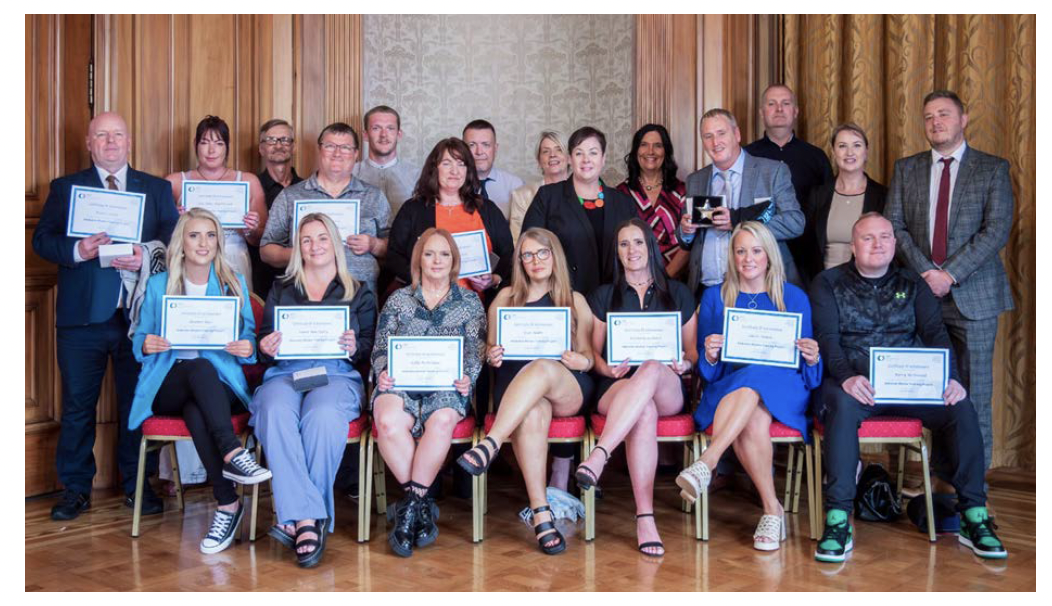
2.2.6 Psychologically Informed
Ensuring that people have access to mental health and wellbeing support is central to delivering a whole system response. We are continuing improvement work to ensure mental health and substance use services work better together. Following the Rapid Review of Mental Health and Substance Use Services, in 2023-24 we continued to deliver the improvement plan which is based on the recommendations set out within the report. This includes the development and implementation of a gold standard protocol for mental health and substance use services. We are also continuing to work across government to ensure that services are able to deliver trauma-informed care, tailored to the needs of individuals.
In 2023-24, we worked with COSLA, NHS Education for Scotland (NES), the Improvement Service and the Resilience Learning Partnership to roll out a National Trauma Training Programme (NTTP). We developed proposals to recruit a National Lead specialist, with experience in substance use and trauma-informed practice, within the Transforming Psychological Trauma Implementation Coordination Network (TPTIC). Funding in 2024-25 will be used to train trauma trainers in local areas. This will ensure that workers in services are trained and equipped in trauma- informed practice to ensure appropriate responses and support is given.
We also have continued to focus on implementing the MAT standards, which include requirements for all MAT to be psychologically informed (MAT standard 6) and trauma-informed (MAT standard 10). Progress towards full implementation of the MAT standards is published annually by Public Health Scotland in a Benchmarking Report. The report for 2023-2024 was published on 9 July 2024.
Contact
There is a problem
Thanks for your feedback